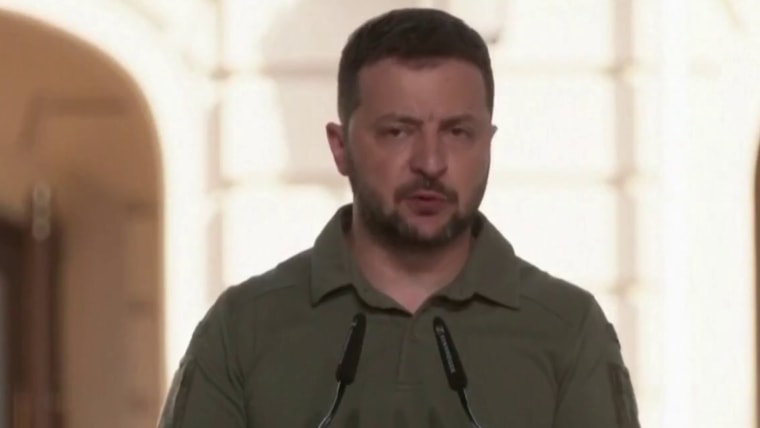VILNIUS, Lithuania — After rallying trans-Atlantic allies in a message of support for Ukraine as it vies for new security guarantees, President Joe Biden now faces critics who say the distant promise of its path to future NATO membership will do little to ward off Russia’s aggression in the near term.
The military alliance is meeting here in Lithuania’s capital this week to discuss plans to shore up its defenses against Russia, with the war in Ukraine atop the agenda.
Kyiv argues that it won’t be safe from Moscow until it’s a member of NATO, an alliance whose bedrock commitment is the mutual defense of all its members. Talk of an invitation into the alliance for Ukraine, or even a pathway, was watched closely leading up to the summit and throughout Tuesday as the 31 leaders attempted to forge a consensus on the issue.
Previewing the summit, Biden’s national security adviser told reporters that leaders would “send a united, positive signal on Ukraine’s path to future member membership in the alliance,” though they were unlikely to offer a timeline for the process.
“Every few months, the question is called, ‘Can West hang together? Can NATO hang together, trans-Atlantic unity hang together?” Jake Sullivan said. “Every time allies gather, that question gets re-upped, and every time allies come together and answer forcefully and vehemently, ‘Yes we can.’”
Sullivan also pushed back on the notion that cracks had appeared inside the alliance over Washington’s decision to provide Ukraine with cluster bombs, saying that Britain was simply meeting its “legal obligation” when Prime Minister Rishi Sunak said he “discourages” Ukraine’s use of the controversial munitions.
The summit in Vilnius would “very much disappoint” Russian President Vladimir Putin, who “has been counting on the West to crack, NATO to crack, the trans-Atlantic alliance to crack,” Sullivan said.
The summit opened with Biden touting the entry of two new members into the alliance after Turkey agreed to support Sweden in a sudden reversal. Yet allies could not escape scrutiny over their assessment of a pathway for Ukraine.
Asked point-blank after an interview with NBC News’ Andrea Mitchell on Tuesday whether the word “invitation” would appear in the summit’s final communique, NATO Secretary-General Jens Stoltenberg responded by saying Ukraine would see a “positive and strong message on Ukraine and the path forward for membership.”
Soon after, Biden, who is set to meet with Ukrainian President Volodymyr Zelenskyy on Wednesday before delivering a speech at Vilnius University, appeared to take steps to mollify criticism from those who felt the alliance wasn’t going far enough.
After Zelenskyy lashed out over “vague wording about ‘conditions’” in a draft communique that leaders of the defense alliance were negotiating on Tuesday, Biden said in a carefully worded statement that Washington backs language on the “future of Ukraine joining NATO.”
Still, Biden warned that any NATO fractures risked rewarding Putin, whom he insisted would not “break” the alliance.
Kyiv has pressed the 31 leaders of the countries that make up the North Atlantic Treaty Organization for clearer security guarantees, even as Biden over the weekend ruled out a pathway to membership while the war is ongoing and said political and security reforms that must be met render any vote “premature.”
But closing the gap between the president’s comments and NATO allies who have urged a path for Ukraine publicly took on a measure of urgency Tuesday.
“What Biden needed here was NATO unity,” said Michael Allen, who was a senior director on the National Security Council under President George W. Bush. “He wanted to project that to the Russians that there’s absolutely no daylight between us at all.”
In the formal communique from allies, NATO promised that it “will be in a position to extend an invitation to Ukraine to join the alliance when allies agree and conditions are met.”
“Ukraine’s future is in NATO,” the document said.
Not everyone was satisfied with that wording.
“They failed to come up with the right combination of words that would both give comfort to Ukraine that eventually they would become NATO members, and also signal caution, as the Western Europeans and the United States feel about provoking Russia,” Allen said.
Bret Bruen, a National Security Council aide in the Obama administration, said NATO risks prolonging the conflict without tangible progress on Ukraine’s membership demand.
“This summit was supposed to send a strong message to a weak Putin,” Bruen said. “Instead, it has delivered a diplomatic dud, failing to meet Ukrainians and many of our allies’ demands that there be a clear, concrete path to membership.”
“Dangling a distant prospect in front of Kyiv is both insufficient and insulting,” he added, charging that the outcome delivers Moscow an incentive to continue the war.
It “tells Moscow that so long as they drag on this conflict and don’t negotiate a resolution, Ukraine can be kept from NATO,” Bruen said.







